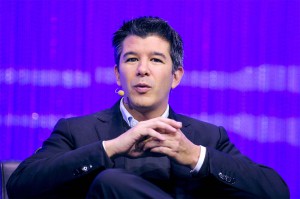
Uber CEO Travis Kalanick may be in hot water with Trump supporters and opponents after this weekend.
In a surprisingly contentious week in the United States, capped by nationwide protests over the U.S. immigration and travel ban, even business has taken on an unexpectedly political tone. That includes the fast-emerging ride-sharing business.
Uber and its and CEO Travis Kalanick took criticism from some Trump opponents after the ride-sharing company’s founder agreed to serve on the new president’s economic advisory council. But the heat was turned up after some accused the San Francisco company of trying to take advantage of a boycott of New York’s JFK Airport by competing taxi drivers. Chief rival Lyft, meanwhile, is stirring things up among Pres. Trump’s supporters for its weekend donation of $1 million to the American Civil Liberties Union.
The line between the two companies is not as distinct as it might seem, however. But, if anything, Uber could find itself in hot water with both the president’s critics, as well as his supporters.
The ride-sharing service leader’s CEO is one among a wide range of business leaders to join Trump’s advisory council, a group that includes executives from traditional manufacturers like General Motors’ Chairman and CEO Mary Barra, as well as tech industry giant IBM’s CEO Ginni Rometty. Elon Musk, who runs a trio of rocket, solar panel and battery-car businesses, is also a member, as is Kalanick.
With the country facing an unusually intense degree of polarization in the wake of Trump’s inauguration, those business leaders have found themselves facing both praise and anger. Musk has tried to position his decision as a way to exert a positive influence on the new president about issues such as global warming.
But Uber was seen as taking sides over the weekend when it appeared to try to short-circuit a move by New York drivers who were briefly boycotting rides to JFK. The airport was one of 30 hit by protests over the weekend in opposition to what many are calling a Muslim travel ban.

Lyft founders Logan Green, left, and John Zimmer, right, came out strongly against Trump's travel ban.
A group called the New York Taxi Workers Alliance had called for a boycott of JFK, while encouraging Uber and Lyft drivers to participate.
(Automakers look for options, weigh costs under Trump. For the story, Click Here.)
Uber, in turn, disabled the so-called surge pricing that customers pay during high-demand periods, a move some critics on social media claimed was aimed at taking advantage of the protests by undercutting local taxi companies.
“Surge pricing has been turned off at #JFK Airport,” Uber said, in an initial tweet from its New York operations center. But the company on Sunday tried to clarify its position on Sunday with a statement that said, “We’re sorry for any confusion about our earlier tweet—it was not meant to break up any strike. We wanted people to know they could use Uber to get to and from JFK at normal prices, especially last night.”
An unknown number of Uber users nonetheless have been reported to have deleted the company’s smartphone app.
The irony is that Uber had actually criticized the president’s Executive Order on immigration shortly after it was signed, though Kalanick’s statement appeared soft to many Trump foes. The ride-sharing service was more blunt in its Sunday statement that it planned to, “urge the government to reinstate the right of U.S. residents to travel — whatever their country of origin — immediately,” though its language appeared to focus specifically on green card holders.
(Strange bedfellows: Tesla’s CEO Musk unexpectedly engages with Trump despite strong differences. Click Here for the story.)
Kalanick, who met with the president last Friday, also announced Uber would compensate any of its drivers who were affected by the travel ban and barred from entering the U.S. It is also creating a $3 million fund to help drivers facing immigration problems.
For its part, Lyft made its opposition to the Executive Order unambiguous. It issued a blog post declaring that, “Banning people of a particular faith or creed, race or identity, sexuality or ethnicity, from entering the U.S. is antithetical to both Lyft’s and our nation’s core values.” Company co-founders John Zimmer and Logan Green stressed that, “We stand firmly against these actions, and will not be silent on issues that threaten the values of our community.”
They announced they were backing up their position with a $1 million donation to the ACLU, the civil liberty group that has been challenging the travel and immigration ban in federal court.
Most of the other members of the president’s economic advisory group have been silent on the immigration issue since the Executive Order was signed, though Musk’s Tesla also denounced the new policy.
(To see more about Uber agreeing to pay its “duped” drivers, Click Here.)
In general, American businesses have tried to remain on the sideline, though there has been a strong response from the CEOs of key Silicon Valley firms, including Apple, Google, Microsoft and Netflix.
